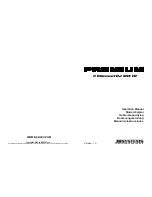
NumaLink-3.0™ Users Guide and Service Manual
Page 31 of 33
7.2.2 The
out_remote_ae
Directive
The out_remote_ae directive allows you to configure
remote DICOM Application Entities (AEs) for
DICOM write.
It must follow a translation directive, and it is associated with the translation directive that
immediately precedes it. This directive applies only to translation directives that specify a DICOM format
as the output format; otherwise, it is ignored. It corresponds to the DICOM remote AE information
described in section 4.2.2.
The presence of an out_remote_ae directive means that the translation will result in a DICOM C-STORE
request to the specified remote AE. If an out_remote_ae directive is not present, the translation simply
writes DICOM Part 10 files in the output directory specified in the associated translate directive. There
can be multiple instance of this directive per translation; each on indicates a separate remote AE to which
to perform the C-STORE.
The out_remote_ae directive has the following format:
out_remote_ae
ae-title node port
{
friendly-name
| "" } {
transfer-syntax
| "" }
out_remote_ae
A keyword that specifies this line is a DICOM remote AE output directive.
ae-title
The formal title of the remote AE for access (defined by remote AE's configuration)
node
The node on which the remote AE exists; may be a node name (e.g., barney)
or TCP/IP address (e.g., 152.8.300.24)
port
The TCP/IP port number on which the remote AE listens for requests (defined by
remote AE's configuration)
friendly-name
An arbitrary descriptive name given to the remote AE to aid in selection (maximum
16 characters; must not include white space; if a friendly name is not provided, this
argument must be "")
transfer-syntax
The transfer syntax to be used when communicating with this AE; must be one of
the following:
•
IMPL_LIT_END
(implicit little endian)
•
EXPL_LIT_END
(explicit little endian)
•
EXPL_BIG_END
(explicit big endian)
If a transfer syntax is not provided, this argument must be "", and the transfer syntax
defaults to implicit little endian.
The following is an example of a valid configuration file including an out_remote_ae directive:


































